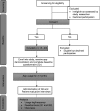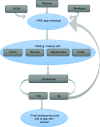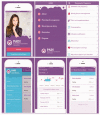Exploring the acceptability and feasibility of a preconception and diabetes information app for women with pregestational diabetes: A mixed-methods study protocol
- PMID: 29942610
- PMCID: PMC6001229
- DOI: 10.1177/2055207617726418
Exploring the acceptability and feasibility of a preconception and diabetes information app for women with pregestational diabetes: A mixed-methods study protocol
Abstract
Background: Women with diabetes are at increased risk of adverse maternal and fetal outcomes. Preconception care can improve pregnancy outcomes and is paramount to minimise complications, but, current provision is sub-optimal. Mobile technology, particularly smartphones and apps have the potential to improve preconception care provision but research is lacking in this area. The need to use modern technologies to improve preconception care knowledge and awareness led to the development of a preconception and diabetes information app in Stage A of this study.
Objective: The aim of this paper, Stage B of the study, is to explore the feasibility and acceptability of the Preconception and Diabetes Information app to improve preconception care knowledge and attitudes in women with diabetes, and explore the potential for wider implementation.
Methods: A mixed-methods study design adopting a quasi-experimental approach will assess women's knowledge and attitudes related to preconception care, and level of patient activation (knowledge and confidence for self-management of health) before and after the three-month intervention period. A log of activity will be used to determine engagement with the app and semi-structured interviews will explore women's experiences.
Conclusions: This is the first study to explore the acceptability and feasibility of a preconception and diabetes information app for women with diabetes. The app has potential to change the way preconception care is delivered, improve pregnancy outcomes and be widely implemented both in developed and developing countries. This is important given the considerable shortfalls in current preconception care services in the United Kingdom and around the world.
Keywords: Preconception care; diabetes mellitus; education; mobile applications; mobile health; smartphones; technology; women.
Conflict of interest statement
The author(s) declared no potential conflicts of interest with respect to the research, authorship, and/or publication of this article.
Figures
Similar articles
-
Preconception and Diabetes Information (PADI) App for Women with Pregestational Diabetes: a Feasibility and Acceptability Study.J Healthc Inform Res. 2021 Aug 26;5(4):446-473. doi: 10.1007/s41666-021-00104-9. eCollection 2021 Dec. J Healthc Inform Res. 2021. PMID: 35415455 Free PMC article.
-
Exploratory study of clinician and patient views regarding the use of a preconception care app for women with diabetes.Health Informatics J. 2020 Dec;26(4):2673-2688. doi: 10.1177/1460458220921707. Epub 2020 May 28. Health Informatics J. 2020. PMID: 32460661
-
Preexisting Diabetes and Pregnancy.In: Cowie CC, Casagrande SS, Menke A, Cissell MA, Eberhardt MS, Meigs JB, Gregg EW, Knowler WC, Barrett-Connor E, Becker DJ, Brancati FL, Boyko EJ, Herman WH, Howard BV, Narayan KMV, Rewers M, Fradkin JE, editors. Diabetes in America. 3rd edition. Bethesda (MD): National Institute of Diabetes and Digestive and Kidney Diseases (US); 2018 Aug. CHAPTER 5. In: Cowie CC, Casagrande SS, Menke A, Cissell MA, Eberhardt MS, Meigs JB, Gregg EW, Knowler WC, Barrett-Connor E, Becker DJ, Brancati FL, Boyko EJ, Herman WH, Howard BV, Narayan KMV, Rewers M, Fradkin JE, editors. Diabetes in America. 3rd edition. Bethesda (MD): National Institute of Diabetes and Digestive and Kidney Diseases (US); 2018 Aug. CHAPTER 5. PMID: 33651557 Free Books & Documents. Review.
-
Preconception care for women with type 1 or type 2 diabetes mellitus: a mixed-methods study exploring uptake of preconception care.Health Technol Assess. 2017 Mar;21(14):1-130. doi: 10.3310/hta21140. Health Technol Assess. 2017. PMID: 28398196 Free PMC article.
-
The prevalence and nature of the use of preconception services by women with chronic health conditions: an integrative review.BMC Womens Health. 2015;15:14. doi: 10.1186/s12905-015-0165-6. Epub 2015 Feb 18. BMC Womens Health. 2015. PMID: 25783639 Free PMC article. Review.
Cited by
-
Preconception and Diabetes Information (PADI) App for Women with Pregestational Diabetes: a Feasibility and Acceptability Study.J Healthc Inform Res. 2021 Aug 26;5(4):446-473. doi: 10.1007/s41666-021-00104-9. eCollection 2021 Dec. J Healthc Inform Res. 2021. PMID: 35415455 Free PMC article.
-
Trends in Factors Affecting Pregnancy Outcomes Among Women With Type 1 or Type 2 Diabetes of Childbearing Age (2004-2017).Front Endocrinol (Lausanne). 2021 Feb 22;11:596633. doi: 10.3389/fendo.2020.596633. eCollection 2020. Front Endocrinol (Lausanne). 2021. PMID: 33692751 Free PMC article.
-
Development, feasibility and acceptability of a self-efficacy-enhancing smartphone application among pregnant women with gestational diabetes mellitus: single- arm pilot clinical trial.BMC Pregnancy Childbirth. 2022 Apr 23;22(1):358. doi: 10.1186/s12884-022-04684-1. BMC Pregnancy Childbirth. 2022. PMID: 35461221 Free PMC article.
-
Developing digital applications for tailored communication in orthopaedics using a Research through Design approach.Digit Health. 2019 Jan 24;5:2055207618824919. doi: 10.1177/2055207618824919. eCollection 2019 Jan-Dec. Digit Health. 2019. PMID: 30719322 Free PMC article.
-
Development of mobile application for cervical cancer screening in women: Protocol of a multi-phase study.J Educ Health Promot. 2024 Feb 7;13:5. doi: 10.4103/jehp.jehp_1603_22. eCollection 2024. J Educ Health Promot. 2024. PMID: 38525208 Free PMC article.
References
-
- International Diabetes Federation. Diabetes atlas, 7th ed http://www.diabetesatlas.org/ (2015, accessed 21 June 2016).
-
- NICE Clinical Guideline NG3. Diabetes in pregnancy: Management from preconception to the postnatal period, http://nice.org.uk/guidance/ng3 (2015, accessed 29 September 2016).
-
- McCance DR. Pregnancy and diabetes. Best Pract Res Clin Endocrinol Metab 2011; 25: 945–958. - PubMed
-
- Knight M, Kenyon S, Brocklehurst P. Saving lives, improving mothers' care: Lessons learned to inform future maternity care from the UK and Ireland Confidential Enquiries into Maternal Deaths and Morbidity 2009–2012, Oxford: National Perinatal Epidemiology Unit, 2014.
LinkOut - more resources
Full Text Sources
Other Literature Sources




